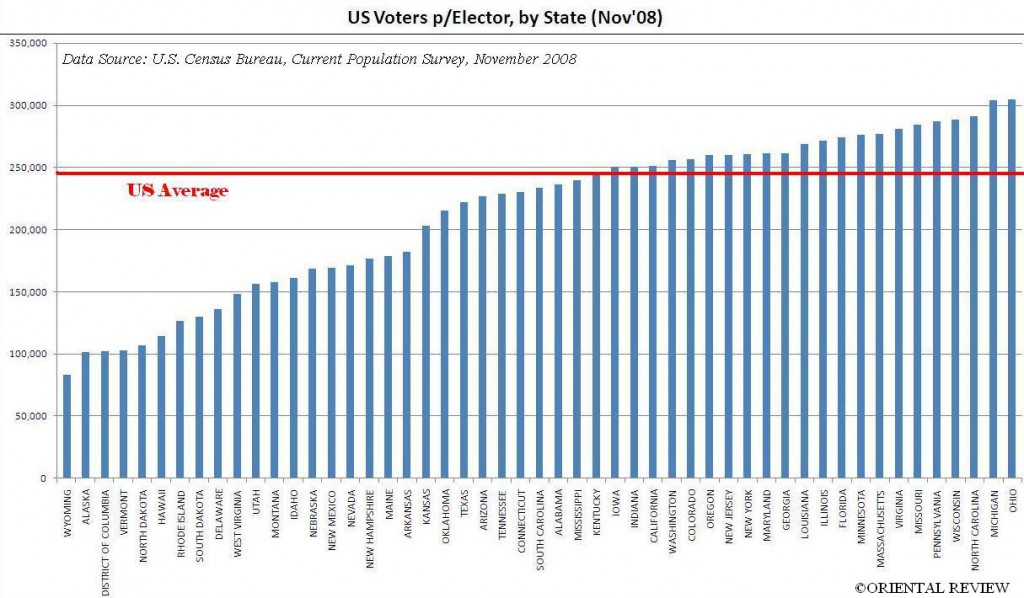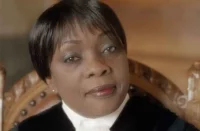The US presidential elections are not direct, not universal, not equal, and do not safeguard the secrecy of voting. This is shown by the reports of all the OSCE Office for Democratic Institutions and Human Rights’ missions to monitor the US presidential elections starting from 2002. The reports recommend that the American authorities resolve the issue of the excessive and disproportionate restriction of the active voting rights of a significant section of the American population. Unfortunately, over the last ten years there have been no major changes for the better. Since the USA took on the role of “arbiter of humanity”, the state of the electoral system and the protection of the electoral rights of citizens is moving far beyond a purely internal problem of the United States. Let us try to briefly analyze some of the key issues.
The electoral system. There is a belief that on 6 November this year, the American public will vote for their president. In actual fact, the head of state endowed with sweeping powers will not be voted for by the people, but rather by a relatively small number of so-called electors. Thus it will not be the choice of the American public who will become president, but a person appointed by just 538 people. Moreover, the electors can support a completely different candidate from the one they have been “entrusted” to vote for. In general, one is only able to talk about the American people voting for their president with a stretch of the imagination, while the right of the average American to become the president is not worth talking about at all.
(The extremely uneven “weight” of the electors in different US states is also surprising. For example, according to US Census Bureau data on the 2008 election results, each elector from the state of Wyoming “relayed” the votes of approximately 83,000 voters, while the electors from the states of Florida, Minnesota, Massachusetts, Virginia, Missouri, Pennsylvania, Wisconsin, North Carolina, Michigan and Ohio “elected” the president on behalf of 270,000-305,000 of the Americans who took part in the voting. – See Graph, ORIENTAL REVIEW)

In its report, the human rights organization Advancement Project found that the voting policies of many of the federal territories of the USA are threatening the participation of millions of citizens – immigrants from Latin America – in the November presidential elections. According to this organization, there are legislative discriminatory barriers in 23 states which could impede the registration and voting of more than ten million Spanish-speaking American citizens. American human rights defenders rightly believe that the laws restricting the right to vote are relegating those members of ethnic minorities who have been naturalized in the USA to “second class” citizens in comparison with “white people” and generally undermining their chance to take part in the country’s democratic development.
Electoral legislation. There is a decentralized system of organizing and holding federal elections in the USA. Each of the 50 states, the Federal District of Columbia and six territories have separate legislation regarding US presidential elections. Differences in regulatory legislation and procedures exist even among the districts of one state. In addition, a large amount of the responsibilities of elective bodies are entrusted to the states’ executive authorities by law, while legal regulations for candidates’ pre-election campaigns are practically non-existent.
Electoral administration. International observers believe that the lack of a centralized independent body to hold elections is an obvious flaw in the American voting system and one of the reasons for the many violations of citizens’ electoral rights.
In accordance with US legislation, the voting process is organized by state authorities and other territorial bodies. Thus state authorities in places which have been given the primary responsibility of forming electoral commissions, organizing the voting and announcing the results are a key tool in the use of dubious voting technologies at the individual state level.
According to the American press, the Republican Party of the USA currently has several more resources at its disposal than the Democratic Party. Thus the Republicans are in charge of 29 governors’ offices against the Democrats’ 20. An advantage of the Republican’s is that of the nine “swing” states, the Democrats only occupy governors’ offices in two of them – North Carolina and Colorado. Furthermore, it is believed that Mitt Romney supporters have administrative resources in Florida, Ohio, Iowa and Virginia in favour of the Republicans.
Voter registration. There are also numerous violations of citizens’ rights in the USA with the registration of American voters.
At the beginning of 2012, one in five American adults was not included on the electoral register and the information of 24 million voters was incorrect. Many Americans forget to provide information about their change of address when moving house, while 2.75 million citizens are registered in several states at the same time. There are instances where they have been listed in six at once. The lists also include nearly 1.8 deceased voters (Pew Center on the States report).
The compilation of electoral registers is regulated by local legislation. According to the OSCE/ODIHR Mission which took place in America at the beginning of 2012, nearly 51 million American voters were not registered for the forthcoming elections. A total of 4.1 million citizens living outside of the USA are unable to vote. More than five million former prisoners are still deprived of their right to vote due to restrictive legislation or cumbersome procedures to restore their rights.
Voters’ identification documents. The USA is lacking a unified approach to the issue of identifying citizens at polling stations.
At polling stations in 19 states, voters are not asked to prove their identity at all but are simply checked against the lists, while in another 16 regions of the country they are allowed to make do with non-photographic identification. In the 15 states where photographic identification is required, citizens can be refused the right to vote even if they are on the lists.
Exposure of personal data. The growing unease of the American public regarding the exposure of confidential information on voters’ political preferences has once again been justified while monitoring voting in the 2012 primaries.
Information about party membership is being stored electronically. This can be accessed by the voter themselves, as well as by the administrative staff of counties and states. Party headquarters are using this information to monitor growth dynamics in the number of its supporters. As strange as it may seem, the parties do not treat these official statistics as confidential information about voters.
Registration and counting of votes.
Electronic voting systems are being actively introduced in the USA. In the process, the American equipment does not provide a print function or any other kind of documentary evidence of a citizen having taken part in the voting process. Further still, its software has been declared a trade secret and is not subject to control, which in principle allows the operators of these systems to discard or re-register votes in favour of one or another of the candidates without leaving any trace of the violation.
At the beginning of the 2000s, OSCE/ODIHR experts continuously pointed out problems connected with voting in the USA when using these electronic devices. These included the non-observance of a voter’s privacy, the need for a proper paper printout of voting results with the possibility of checking them mechanically, ensuring transparency in the operation of the electronic devices, issues regarding the public’s confidence in voting technology with the opportunity to obtain software codes, independent testing of the electronic devices, establishing the possibility of recounting votes when there is a minimum difference of votes and many others.
However, not one of these problems has been resolved at the federal level in the USA.
Judicial protection of voting rights. Public officials in America prefer to avoid public discussions on any violations of citizens’ voting rights that have come to light. In practice, extensive discussion on violations of American electoral legislation and the voting rights of the American public does not currently extend beyond the activities of Internet bloggers. However, the American authorities have not carried out any official investigations or judicial appeals on anything the bloggers have made public.
Election monitoring. The monitoring of presidential and parliamentary elections in the USA is largely carried out by poll watchers representing candidates and political parties. In problem areas from the point of view of observing the rights of minorities, a coalition of local NGOs, the Election Protection Coalition, also gets involved. The status of American NGO activists at polling stations is uncertain. Under the laws of a number of states, local human rights defenders are allowed to be present during the voting process and when the votes are being counted. In other regions, this permission is only extended to the first and second rounds.
In many states, the law generally avoids the issue of national observers, while the regulation of monitoring, as with foreigners, is left to the discretion of electoral commission employees.
On the whole, monitoring in the USA on the part of civil society beyond organisations based on the free will of citizens is tied to a two-party system guided more by local customs than by law. It is fragmentary and subject to the influence of electoral commissions, which frequently results not in the protection but rather the violation of the voting rights of the American public, including the freedom of expression and the secrecy of the vote.
International election monitoring. For the majority of the American people, the involvement of representatives from foreign countries in monitoring US elections is still relatively exotic, while in many electoral districts they simply have no idea about the international obligations of the USA in the electoral sphere.
At the present time, only the states of Missouri, South Dakota and New Mexico, as well as the Federal District of Columbia, have laws giving access to foreign observers during the election process. In other regions, the issue of the work of foreign observers is under the jurisdiction of local authorities.
In 2010, the National Association of Secretaries of States adopted a resolution inviting international observers from the OSCE to come to the United States on monitoring missions. In previous years, participants in these missions have been repeatedly refused access to polling stations even in those districts which were “open” to foreign observers.
It speaks volumes that there has never been a full-fledged OSCE mission to America. Moreover, the OSCE/ODIHR has repeatedly called on American authorities to take steps to fulfil their international obligations, including strengthening the rights of international observers and the means for them to be present during the voting process and the counting of votes by authority of the law rather than the discretion of local organisers and polling station administrators.
***
To sum up, it should be acknowledged that throughout the 223-year history of the organization and holding of presidential elections in the USA, there is an abundance of examples where the voting rights of Americans have been violated. The information given here makes up just a small part and is clear evidence that the electoral system and electoral legislation in the United States of America is far from perfect. They are contradictory and archaic and, more importantly, they do not meet the democratic principles which the USA has declared as the basis of its own foreign and domestic policies.
Mr. Vladimir CHUROV is the Chairman of the Central Election Commission of Russia.
Source in Russian: Rossiyskaya Gazeta (translated with abridgments)














America which claims to export democracy to the Muslim world – suppress democracy within the country itself. The US presidents are not elected by a popular vote among the 50 states but by the assigned electoral ballots to each of the 50 states in the Federation. The presidential candidates usuall campaign only in the seven states with greater electoral ballots.
http://rehmat1.com/2012/11/07/netanyahu-obama-victory-is-good-for-israel/
The presidential candidates usuall campaign only in the seven states with greater electoral ballots.